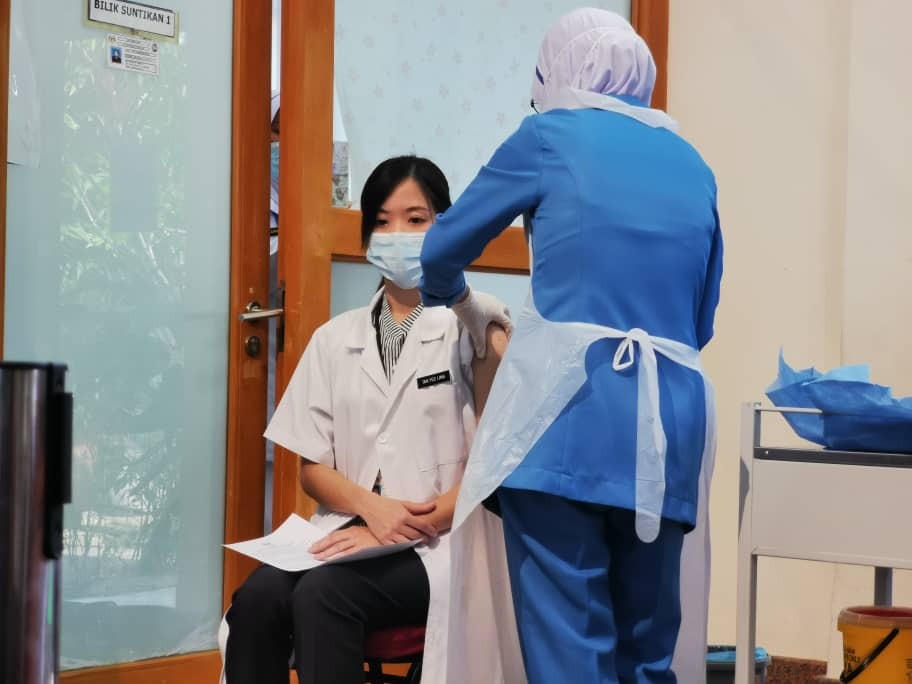KUALA LUMPUR, March 3 — A medical specialist group today urged the government to clarify where various high-risk groups fall on the priority list in the national Covid-19 vaccination programme.
The Academy of Medicine of Malaysia (AMM) welcomed the inclusion of pregnant and breastfeeding mothers, as well as immunocompromised people like cancer patients and people living with HIV, in the coronavirus inoculation drive.
“The vaccine registration process in the MySejahtera app does little to inform pregnant women and immunosuppressed patients of their risk status,” AMM said in a joint statement with the Malaysian Association of Rehabilitation Physicians, the Malaysian Society of Haematology, the Malaysian Urological Foundation, and the University of Malaya Cancer Research Institute.
“It also falls short of providing resources for educating those with comorbidities on the Covid-19 vaccine as it relates to their condition. We urge the government to provide necessary updates to the app that will allow patients to empower themselves with the information and resources to get vaccinated according to their risk group.”
The Covid-19 Immunisation Task Force (CITF) has yet to detail specific priority groups in the second phase of the national vaccine rollout, scheduled to open in less than a month’s time in April.
Some 9.4 million people aged above 60 and those with comorbidities are targeted in the second phase, but CITF hasn’t yet issued a list of such health conditions.
“As immunosuppressed people come in variable diagnoses and conditions, each individual’s medical team should conduct risk-benefit assessments which include the best time and treatment plan that will empower them to get vaccinated,” said AMM.
“There must be adequate communication and coordination with community stakeholders, from medical specialists to community clinics and care homes, to ensure that all immunosuppressed groups can make informed decisions based on their situation.”
AMM also stressed that all people living with HIV (PLHIV) — regardless of their CD4 (protein found on immune cells) count or viral load — should be allowed to get the Covid-19 vaccine, after the Ministry of Health (MOH) said only PLHIV with CD4 counts above 200 could get inoculated.
“The science states that all types of Covid-19 vaccines are safe for PLHIV and while it may not induce a full immune response, some protection is better than none. The exclusion of some PLHIV in the national immunisation programme also risks further stigmatising an already vulnerable population,” said AMM.
MOH said recently that “healthy” cancer patients can also receive Covid-19 vaccines. It previously deemed the Pfizer-BioNTech shot as not suitable for people undergoing cancer treatments like chemotherapy, radiotherapy, and immunotherapy.
AMM cited the World Health Organization (WHO), the UK Scientific Advisory Group of Experts on Immunisation and the US’ Centers for Disease Control and Prevention that have all concluded that the known and potential benefits of vaccinating pregnant and immunosuppressed people outweigh the known and potential risks.
“In fact, both the US and UK have identified cancer patients, including those undergoing chemotherapy and treatment, as priority groups for the vaccine, subject to the advice of their treating physicians. The US has also prioritised vaccinating pregnant women alongside those with underlying medical conditions,” said AMM.
The UK lists very specific Covid-19 vaccination priority groups in its vaccine rollout. All those aged 70 years and above and “clinically extremely vulnerable” individuals, who are considered to be at very high risk of serious illness from coronavirus, are listed as the fourth priority group.
People automatically deemed clinically extremely vulnerable include those with cancer undergoing active chemotherapy, radiotherapy, targeted therapy, or immunotherapy; chronic kidney disease; and solid organ transplant recipients, among others.
Adults aged 16 to 65 years in an “at-risk group”, which are listed in the UK’s sixth priority group for coronavirus inoculation, include those with clinical conditions like diabetes, a heart problem, breathing difficulties, kidney disease, liver disease, lowered immunity due to disease or treatment like HIV infection, rheumatoid arthritis, and who had a stroke, among others.








